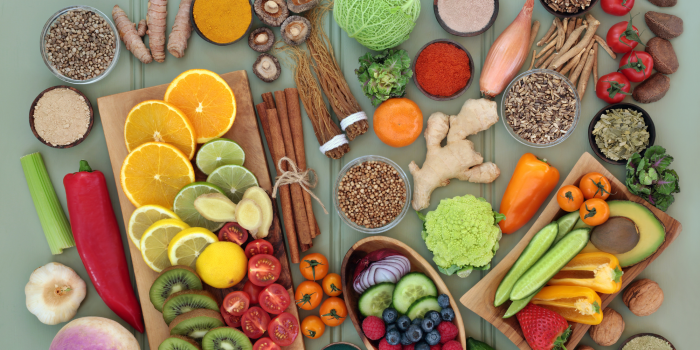
Inflammatory bowel disease and a plant-based diet
July 21st, 2025IBD is the umbrella term used for inflammatory bowel diseases such as Crohn’s disease and ulcerative colitis. A recent study has shown that a plant-based diet can help protect against or offer some relief from IBD, so it’s time to make a new food shopping list if you want to reduce the risk of the inflammatory bowel disease.
In this article, we’ve included a list of the top plant-based foods that are full of essential nutrients, including protein, multivitamins and minerals.
A large-scale health research study reveals the beneficial association between healthy plant-based diets and IBD.
The study, published in the Molecular Nutrition & Food Research Journal, was part of a large-scale health research project involving 143,000 participants in the UK. Patients completed a questionnaire, and researchers graded the participants’ diets based on their intake of healthy plant-based foods. 14 a half years later, statistics revealed that a higher intake of fruits and vegetables lowered the risk of IBD.
Dr Zeh Shen from the Zhejiang University School of Medicine in China said, “Our research indicates that a healthy plant-based diet may protect against inflammatory bowel disease.”
Dr Shen concluded that, “These findings underscore the beneficial association between healthy plant-based diets and reduced risk of ulcerative colitis and Crohn’s disease. They provide important insights for the development of dietary guidelines aimed at preventing IBD.”
IBD
IBD occurs when the immune system attacks the bowel, causing inflammation. The most common inflammatory bowel diseases are ulcerative colitis and Crohn’s disease. Symptoms include belly pain, diarrhoea, rectal bleeding, extreme tiredness and weight loss.
The disease can be in a mild form or cause debilitating symptoms that can lead to life-threatening complications. Such as colon cancer, skin/eye/joint inflammation, primary sclerosing cholangitis, blood clots, and severe dehydration.
IBD can cause bowel obstructions, malnutrition and anal fissures. The severity of the disease depends on where and how bad the inflammation is.
The cause of bowel disease is unknown. Initially, it was believed to be due to diet and stress, but now, the immune system, genetics and the environment are also being highlighted as potential causes. Risk factors are age, race, medical history, family medical history, smoking and medications.
Medicines can be prescribed to relieve symptoms, or part of the bowel can be removed in severe cases.
IBD and a plant-based diet.
What is a plant-based diet?
A plant-based diet is a diet consisting of vegetables, legumes, fruits, wholegrains, nuts, seeds and plant-based oils. There are little or no animal sources in the diet. The diet can reduce the risk of bowel diseases, type 2 diabetes, hypertension, obesity, some different types of cancer and heart disease.
Plant-based foods can produce good bacteria in the gut, but they need to be introduced gradually so as not to upset the stomach. A diet of this type needs to be well planned so it doesn’t lead to nutrient deficiency.
People who eat a plant-based diet, such as vegans and vegetarians, need to make sure they have enough protein. Not only is protein found in dairy products, meat and fish, but also in various plant forms.
With planning, it is easy to achieve the recommended daily intake of nutrients when eating a plant-based diet.
Use our list of high-protein ingredients to include in your shopping list.
1. Protein-rich fruit and vegetables
Some vegetables contain more protein than others – broccoli, spinach, green peas, asparagus, artichokes, potatoes, sweet potatoes and brussel sprouts are the front runners. Fresh fruits include guava, cherimoyas, mulberries, blackberries, nectarines and bananas.
2. Beans
Kidney, black, pinto and other types of beans contain a high amount of protein, complex carbohydrates, fibre, iron, folate, phosphorus, potassium and manganese. A tasty vegetable chilli should be on your menu.
3. Oats and oatmeal
Although not a complete protein, a cup of delicious porridge, for example, contains 5 grams of protein. Other nutrients are zinc, folate, phosphorus and magnesium.
4. Soy milk
It’s quite a popular substitute to add to hot beverages these days. Soy milk contains soy beans and is usually fortified. In addition to protein, it contains a high amount of vitamins and minerals, including calcium and Vitamin D.
5. Tofu, tempeh, edamame
Popular in a stir fries – tofu, tempeh and edamame are high in protein, and all three food types originate from the soya bean. They are full of essential amino acids, iron and calcium.
6. Lentils
Lentils are a great source of protein, and a cup of lentils gives you half your daily protein requirement. Lentil soup is a great option, or mixed with feta cheese and beetroot.
7. Nuts, nut butter and other seeds
They are a great source of protein, but best eaten in raw form because blanching and roasting can damage the nutrients. Almonds are an ideal snack during the day, and walnuts are good in a salad.
8. Mycoprotein
A popular non-animal-based type of fungus used as a meat substitute for things such as veggie burgers, sausages and similar foods found on the shelves in supermarkets.
9. Ezekiel bread
Easier to digest than traditional bread and made from sprouted wholegrains and legumes including wheat, millet, barley and spelt, soya beans and lentils. 2 slices contain 8 grams of protein.
10. Chia seeds
Full of protein, anti-oxidants, iron, selenium, calcium, magnesium and omega-3 fatty acids and derived from the salvia hispanica plant. Ideal to sprinkle on your porridge or in a smoothie.
Lesser-known nutritional sources are seitan, one of the richest plant protein sources, which resembles the look of cooked meat. Nutritional yeast is sold as a yellow powder or flakes. Spelt and teff are ancient grains. Hemp seeds are derived from the cannabis sativa plant, spirulina, a blue/green algae full of nutrition with high amounts of protein and amaranth and quinoa, both grains that don’t grow from grasses, they are pseudocereals.
To improve gut health, we recommend our product Symprove – available in original flavour or passionfruit. It is a water-based multi-strain probiotic supplement which aids IBS.
For further support, we recommend the following information: https://www.nhs.uk/conditions/inflammatory-bowel-disease/ https://www.nhs.uk/conditions/irritable-bowel-syndrome-ibs/further-help-and-support/ https://crohnsandcolitis.org.uk/ https://ibdregistry.org.uk/
References https://www.upi.com/Health_News/2025/07/09/IBD-fruits-vegetables-study/9921752090613/ https://www.mayoclinic.org/diseases-conditions/inflammatory-bowel-disease/symptoms-causes/syc-20353315 https://www.healthline.com/nutrition/protein-for-vegans-vegetarians#hemp-seed








